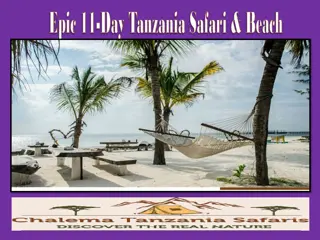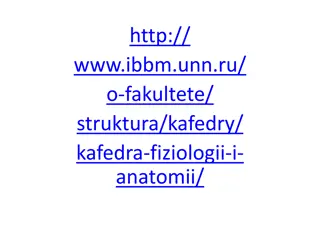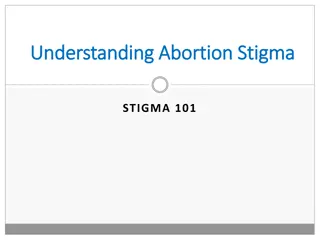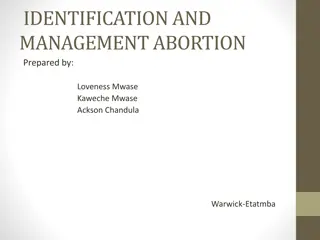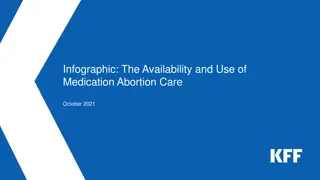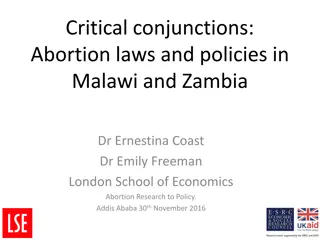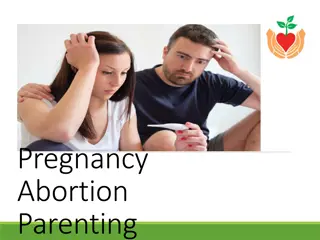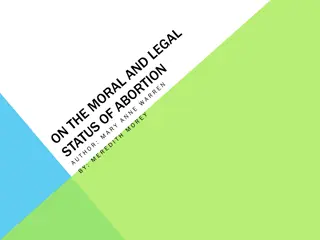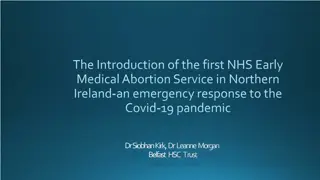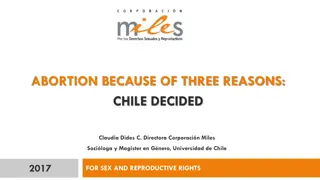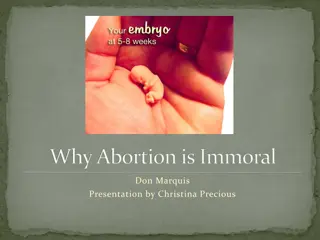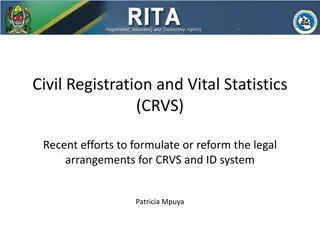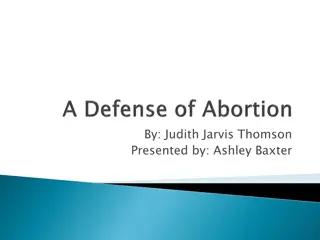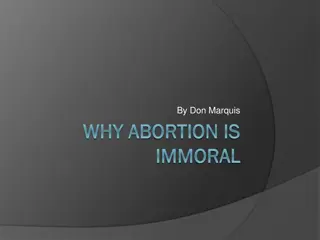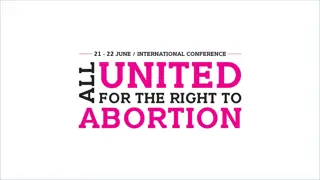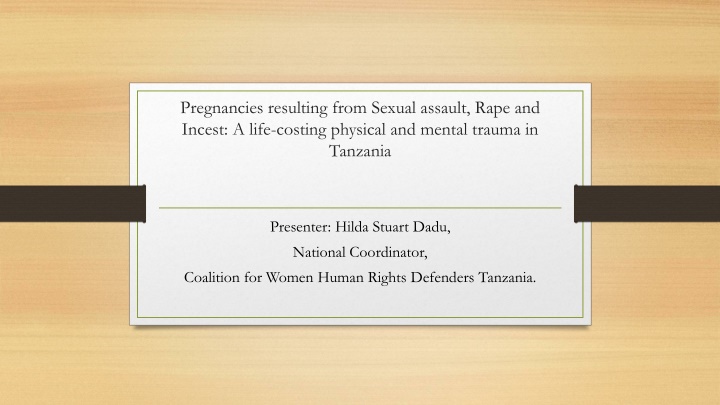
Impact of Restrictions on Abortion for GBV Survivors in Tanzania
"Explore the repercussions of restrictive abortion laws on survivors of gender-based violence in Tanzania, leading to physical and mental health challenges. Learn about the need for safe abortion access to protect women's rights and well-being."
Download Presentation

Please find below an Image/Link to download the presentation.
The content on the website is provided AS IS for your information and personal use only. It may not be sold, licensed, or shared on other websites without obtaining consent from the author. If you encounter any issues during the download, it is possible that the publisher has removed the file from their server.
You are allowed to download the files provided on this website for personal or commercial use, subject to the condition that they are used lawfully. All files are the property of their respective owners.
The content on the website is provided AS IS for your information and personal use only. It may not be sold, licensed, or shared on other websites without obtaining consent from the author.
E N D
Presentation Transcript
Pregnancies resulting from Sexual assault, Rape and Incest: A life-costing physical and mental trauma in Tanzania Presenter: Hilda Stuart Dadu, National Coordinator, Coalition for Women Human Rights Defenders Tanzania.
Pregnancies resulting from Sexual assault, Rape and Incest: A life-costing physical and mental trauma in Tanzania In Tanzania, it is estimated that one million women get unintended pregnancy of which 39% end in abortion (Guttmatcher, 2016) As a result of in-access to safe abortion services, women are forced to keep unwanted pregnancy or procure unsafe abortion Restriction for procurement of abortion is provided under Section 150, 151, 152, 219 and 230 of the Penal Code (Cap. 16 R.E 2019). The law is such restrictive that it doesn t provide for termination of pregnancy for any reason including pregnancy resulting from rape, sexual assault, and incest.
Pregnancies resulting from Sexual assault, Rape and Incest: A life-costing physical and mental trauma in Tanzania This contravenes with Tanzania s commitment to the ratified Protocol to the African Charter on Human and People s Rights on the Rights of Women in Africa (Maputo Protocol, 2003). The Maputo Protocol provides for protection of the reproductive rights of women by authorizing medical abortion in cases of sexual assault, rape, incest, and where the continued pregnancy endangers the mental and physical health of the mother or the life of the mother or the foetus.
Pregnancies resulting from Sexual assault, Rape and Incest: A life-costing physical and mental trauma in Tanzania Restriction of legal and safe abortion especially for pregnancies resulting from sexual assault, rape or incest has badly impacted on the physical and mental health of many women and girls in Tanzania. This is because incidences of rape and incest are persistently high and evident. (Police Gender Desk Report 2021, CWHRDs TZ Documentation of 30 Court cases 2023. With legal and safe abortion, such type of pregnancies would have been safely terminated in order to enhance women s mental and physical health, and reducing chances for unsafe abortion which contributes to maternal mortality and morbidity.
Pregnancies resulting from Sexual assault, Rape and Incest: A life-costing physical and mental trauma in Tanzania Anecdotal data on abortion trend and pathways in Tanzania shows that over 75% of all unintended pregnancies which resulted from sexual assault, rape and incest end in unsafe abortion. Despite under-reporting of pregnancies resulting from GBV incidences including sexual assault, rape and incest; still, a significant number of such incidences is recorded at different police gender desks across regions in the country. Most recent data from the Police Gender Desk Report, (2021) reveals that a total of 29,373 GBV cases were reported, out of which 12, 043 (41%) were cases of rape, incest and sexual assault. Whereas 6,305 (21.5%) women were raped, 5,751 (19.5%) women experienced sexual assault while other 20 women experienced incest.
Pregnancies resulting from Sexual assault, Rape and Incest: A life-costing physical and mental trauma in Tanzania Survivors of these incidences testified that the grief, physical and mental trauma they experienced was deadly and their life course and wellbeing was totally affected. Whereas most of the survivors were discouraged by their families and community to report the incidence, others were blamed for disclosing the act. Survivors demonstrated recognition of the short- and long-term consequences of rape and cited trauma manifestations such as injuries to the genitalia, acquisition of chronic diseases, unintended pregnancies and the inability to conceive in the future
The psychosocial impact of rape was perceived to manifest itself as poor performance and drop-out of girls in school, and withdrawal from social interaction. An attempt of keeping an unintended pregnancy resulting from incest, which is further disvalued by most of our traditions. For this reason, not only keeping such pregnancies cause physical and mental torture to women, but also detaches them from the community. Notwithstanding, a huge number of these incidences and their impact on a woman s life, physical and mental health, the law has remained restrictive such that it doesn t provide for procurement of safe abortion for women who got pregnant as a result of sexual assault, rape and incest.
In observance of the international, regional and sub-regional instruments including the Universal Declaration of Human Rights, Intervention Convention on Civil and Political Rights (ICCPR), Convention on the Elimination of All Forms of Discrimination Against Women (CEDAW), African Charter on Human and People s Rights (ACHPR), Maputo Protocol and East African Community Treaty (EAC Treaty). And, in respect to article 13 of the Constitution of United Republic of Tanzania of 1977 as amended from time to time; it s clearly that victims of sexual assault, rape and incest are disproportionately affected on one hand as victims of sexual violence while on the other hand they are forced to carry the pregnancy to term; something which subject them to physical and psychological trauma for the entire life.
A need to a Legal Improvement 1. The Parliament to amend Section 150, 151, 219 and 230 of the Penal Code (Cap 16. R.E 2019) to allow termination of pregnancy resulting from sexual assault, rape, and incest. A Public Interest Litigation case to test a constitutionality of the penal code of Tanzania has been opened in the Court of Law in Tanzania whereby Coalition is an interested party Coalition has built capacities of 30 women human rights defenders of Tanzania on public interest litigation to increase allies and support the movement of the case. Coalition has documented more than 30 case of incest and rape cases as a evidence base to support the public interest case.
Health Services Recommendations Post-abortion care (PAC) involves a small medical or surgical procedure to ensure that the womb is completely empty. It may also involve treating an infection or injury, depending on the situation. PAC Guidelines (2019) significantly helped to guide PAC providers in planning, providing care, and evaluating services. For instance, the PAC standard operating procedure focusing on the use of misoprostol in health facilities and pharmacies addressed challenges associated with over-and-under dosage of misoprostol among PAC client. Government has allowed the use of misoprostol in health facilities to support Post Abortion care clients.
Challenges With these development, still victims of sexual assault, rape and incest can not access safe termination of pregnancies due to: - Inadequate awareness on the availability of misoprostol in health facilities - Lack of information of PAC procedures to ordinary women and girls. - There is still high cost of PAC services regarding the procures /guideline lower costs to the client.
ASANTE KWA KUSIKILIZA THANKS FOR LISTENING


